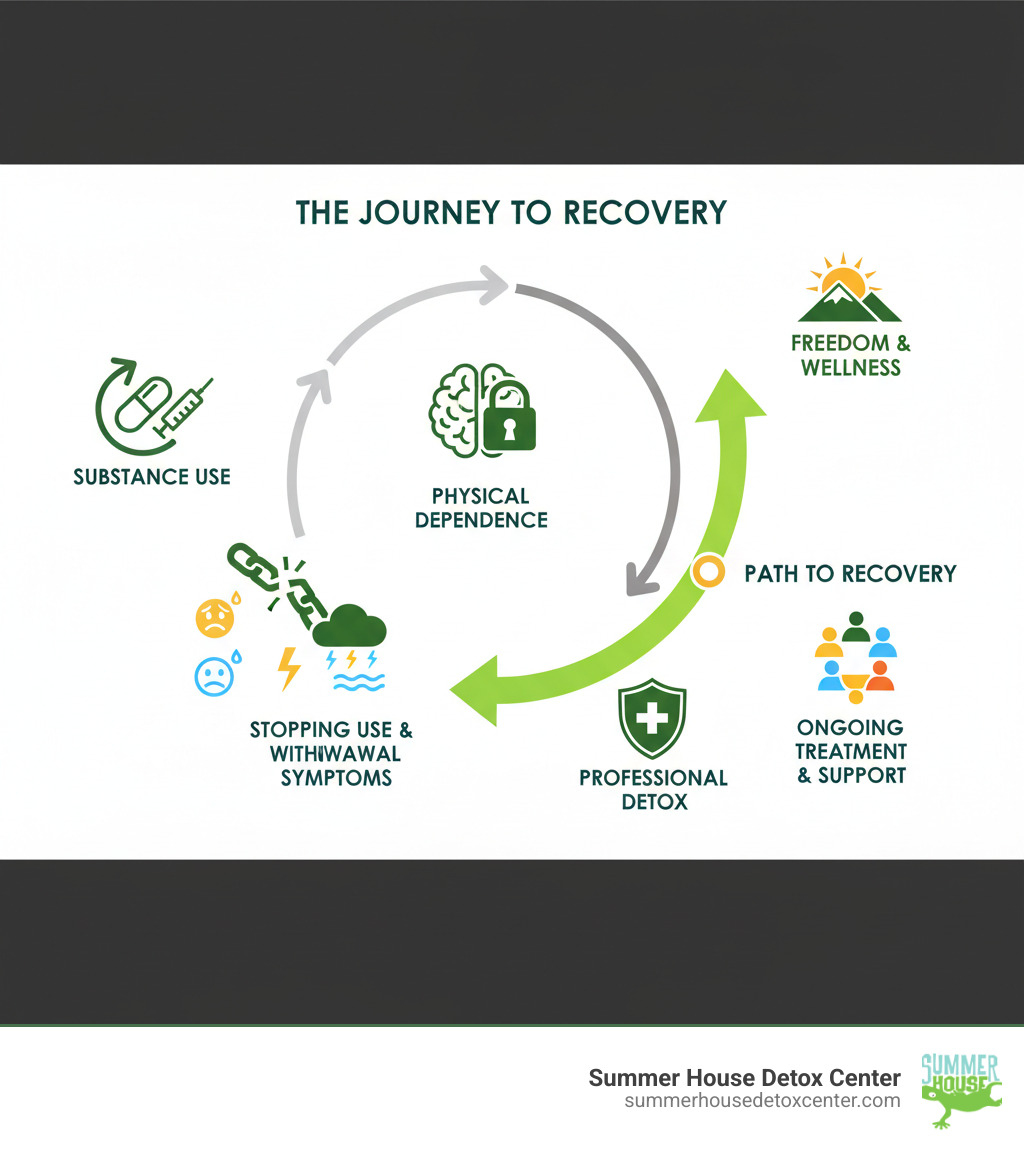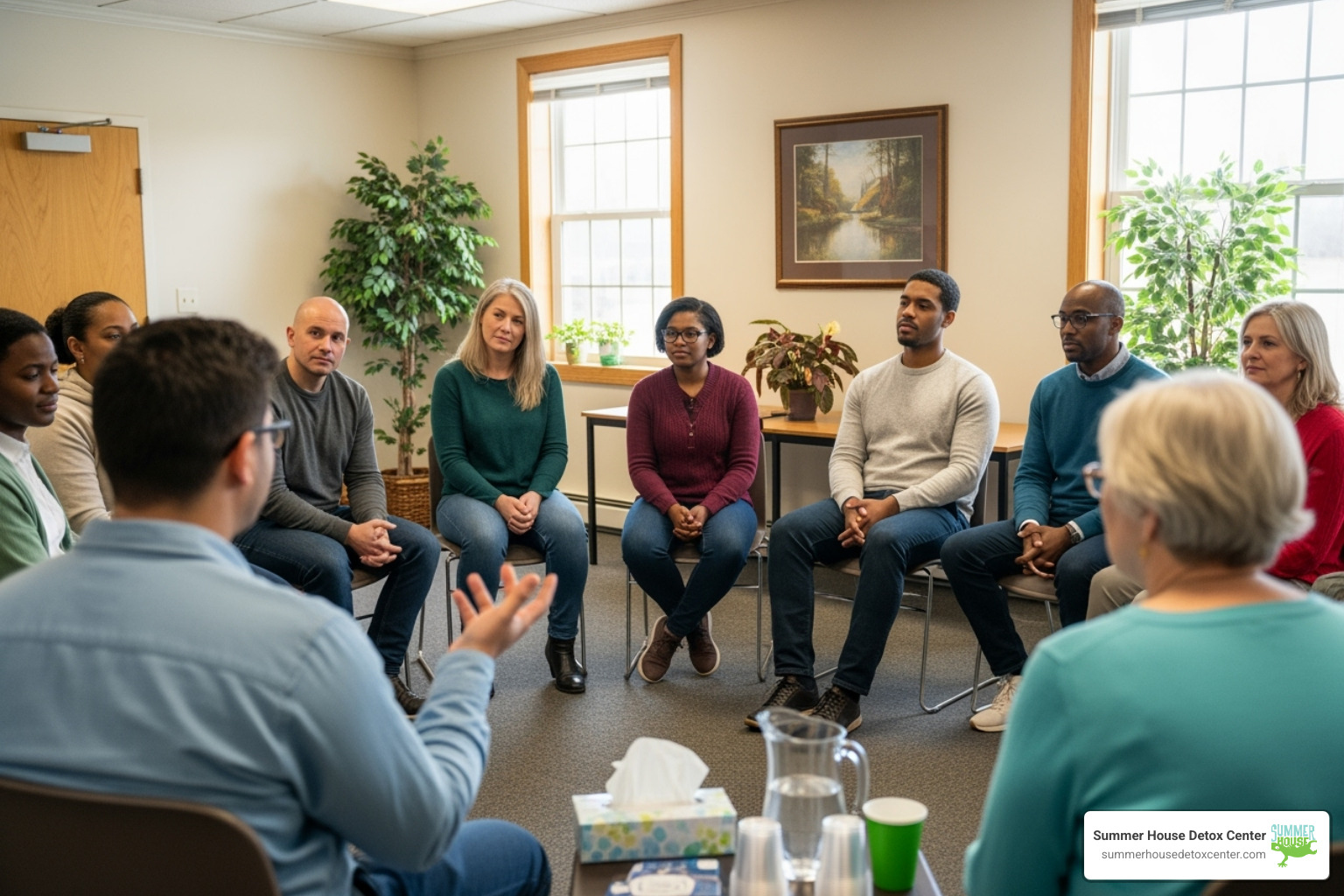Understanding Drug Withdrawal: What You Need to Know
Drug withdrawal help is available, and understanding what to expect is the first step toward recovery. Professional support can make withdrawal from alcohol, opioids, or other substances safer and more manageable.
Quick Answer: What You Need to Know About Drug Withdrawal Help
- Medical detox is safest: Supervised withdrawal reduces risks and discomfort.
- Withdrawal varies: Symptoms and risks differ by substance; alcohol and benzodiazepine withdrawal can be life-threatening.
- Timelines differ: Symptoms can last from days to weeks.
- Medications help: FDA-approved medications ease symptoms and cravings.
- Detox is step one: Ongoing treatment is essential for lasting recovery.
- Help is available in Florida: Local treatment centers provide immediate support.
According to the Centers for Disease Control and Prevention, one in 14 Americans experiences a substance use disorder. If you’re in Miami or anywhere in Florida, you’re not alone.
Drug withdrawal occurs when your body reacts to stopping or reducing a substance it has become dependent on. Your brain adapts to the presence of drugs to maintain balance (homeostasis). When you stop, your body must readjust, causing uncomfortable and sometimes dangerous symptoms. The physical and psychological distress can feel overwhelming, which is why professional help is so critical.
This guide explains withdrawal for different substances, when medical supervision is needed, what medications can help, and how to find support in Florida. Most importantly, you’ll learn that withdrawal doesn’t have to be faced alone—recovery is possible.

Understanding Withdrawal: Symptoms, Timelines, and Risks
When you stop using a substance your body is dependent on, withdrawal begins. It’s your body adjusting to the drug’s absence, and it can range from uncomfortable to dangerous. Drug withdrawal help is essential during this time.
Symptoms can be physical (tremors, sweating, nausea, seizures) and psychological (anxiety, depression, intense cravings). The experience depends on the substance, duration of use, dosage, and your overall health.
Some symptoms can linger long after acute withdrawal in a condition called Protracted Withdrawal Syndrome (PAWS). Mood swings, anxiety, and sleep problems can last for months. Research shows this affects roughly 90% of people recovering from opioid use and 75% from alcohol use. This highlights the need for long-term support.
A critical risk after detox is overdose. During withdrawal, your tolerance drops significantly. If you relapse and use your previous dose, your risk of fatal overdose skyrockets. This is why entering a treatment program immediately after detox is life-saving.
Here’s a comparison of withdrawal timelines for different substances:
| Substance | Onset of Symptoms | Peak Intensity | Duration | Potential Lethality |
|---|---|---|---|---|
| Alcohol | 3-24 hours | 24-72 hours | 2-10 days | High |
| Short-Acting Opioids (e.g., Heroin) | 6-12 hours | 1-3 days | 4-10 days | Low (but high relapse/overdose risk) |
| Long-Acting Opioids (e.g., Methadone) | 12-48 hours | Several days | 10-20 days | Low (but high relapse/overdose risk) |
| Short-Acting Benzodiazepines (e.g., Xanax) | 1-2 days | First 2 weeks | 2-4 weeks or longer | High |
| Long-Acting Benzodiazepines (e.g., Valium) | 2-7 days | First 2 weeks | 2-8 weeks or longer | High |
| Stimulants (e.g., Cocaine, Meth) | Within 24 hours | 3-5 days | A few days to weeks | Low |
Alcohol Withdrawal
Alcohol withdrawal requires medical supervision because it can be life-threatening. Early signs include tremors (“the shakes”), anxiety, and nausea, which worsen over 24-72 hours. Withdrawal can escalate to seizures or Delirium Tremens (DTs), a severe condition with confusion and hallucinations. According to Harvard Health on Alcohol Withdrawal, about 15% of untreated DTs cases are fatal. If you’ve been drinking heavily in Miami, do not detox alone.
Opioid (Heroin, Fentanyl, Painkillers) Withdrawal
Opioid withdrawal feels like a severe flu. While not typically life-threatening, the intense discomfort and cravings make relapse a major risk. Symptoms include muscle aches, diarrhea, nausea, anxiety, and insomnia. As noted by NIDA on Opioid Treatment, the biggest danger is overdose after detox due to lowered tolerance. Immediate follow-up care is crucial.
Benzodiazepine (Xanax, Valium) Withdrawal
Like alcohol, benzodiazepine withdrawal can be life-threatening and requires medical management. The primary risk is seizures, which can occur without warning. Symptoms include severe anxiety, panic attacks, and insomnia. Due to the high risks, a medically supervised taper is the only safe method to stop using benzodiazepines.
Stimulant (Cocaine, Meth) Withdrawal
Stimulant withdrawal is a psychological challenge. After stopping, users often “crash,” experiencing intense depression, an inability to feel pleasure (anhedonia), and severe fatigue. While not physically life-threatening, the severe depression can lead to suicidal thoughts, making professional drug withdrawal help vital for safety.
Finding Professional Drug Withdrawal Help in Florida
Deciding to seek professional drug withdrawal help is a brave first step. In Miami and across Florida, dedicated facilities like Summer House Detox Center are ready to support you through this challenging journey with safety, comfort, and dignity.

Medical detox provides a foundation for lasting recovery. In a supervised setting, you receive 24/7 medical monitoring to manage symptoms and prevent complications—a level of care impossible to replicate at home. For general information, USA.gov Mental Health & Substance Abuse resources is a helpful starting point.
When is Medically Supervised Detox Necessary?
While some consider toughing it out at home, medically supervised detox is essential in several situations:
- Alcohol or Benzodiazepine Use: Withdrawal can be life-threatening due to the risk of seizures and delirium tremens. Professional supervision is non-negotiable for safety.
- Severe Dependence: Long-term, heavy use makes abrupt cessation a shock to the system that requires medical management.
- Co-occurring Medical Conditions: Health issues like diabetes or heart disease increase the risks associated with withdrawal.
- History of Severe Withdrawal: If you’ve had difficult withdrawals before, you’re likely to again. Medical care can ease the process significantly.
- Unsafe Home Environment: A detox facility provides a calm, trigger-free environment crucial for early recovery.
Medications Used to Manage Withdrawal
Medically supervised detox provides access to medications that reduce discomfort and prevent dangerous complications. These are evidence-based tools for safe healing.
- For opioid withdrawal, medications like buprenorphine (Suboxone) and methadone reduce cravings and symptoms. Clonidine and lofexidine (Lucemyra) help with physical symptoms.
- For alcohol and benzodiazepine withdrawal, benzodiazepines are used in a controlled, tapering manner to prevent seizures.
- For post-detox recovery, Naltrexone (Vivitrol) blocks opioid effects and reduces alcohol cravings, while Acamprosate helps rebalance brain chemistry.
The SAMHSA on Medication-Assisted Treatment guide shows how effective these approaches are. At Summer House Detox Center, we create customized medication protocols for each client.
Your Rights in a Florida Emergency Room
If withdrawal becomes a medical emergency, you have rights. The Emergency Medical Treatment and Labor Act (EMTALA) requires hospitals to provide screening and stabilizing treatment, regardless of ability to pay. The Americans with Disabilities Act (ADA) protects you from discrimination.
As documented by the Legal Action Center report, hospitals are obligated to follow evidence-based practices, including providing a “warm handoff” by directly connecting you to ongoing treatment. If you have a life-threatening emergency, call 911. However, a planned detox at a facility like Summer House offers a more comprehensive, therapeutic environment designed for recovery, not just crisis stabilization.
The Journey After Detox: Building a Foundation for Lasting Recovery
Detox is a huge accomplishment, but it’s the beginning of your recovery story. It stabilizes you physically, but addiction also affects your brain, coping mechanisms, and relationships. What happens after detox is crucial for long-term success.
The National Institute on Drug Addiction Treatment emphasizes that effective treatment must address the whole person. Without continued care, the risk of relapse is high.

Creating a Continuing Care Plan
Before you leave Summer House Detox Center, we create a personalized continuing care plan designed around your specific needs.
- Residential treatment offers 24/7 support in a structured environment, ideal for focusing entirely on recovery away from triggers.
- Partial Hospitalization Programs (PHP) provide intensive day treatment while allowing you to return home in the evenings.
- Intensive Outpatient Programs (IOP) offer more flexibility, with therapy sessions a few times per week.
- Individual and group therapy provide spaces to work on personal challenges and connect with peers in recovery.
- Dual diagnosis treatment is vital for addressing co-occurring mental health conditions like depression or anxiety alongside substance use.
Finding Community and Peer Support
Finding others who understand your journey is a powerful part of recovery. These communities offer life-changing support and accountability.
- Narcotics Anonymous (NA) and Alcoholics Anonymous (AA) are 12-step programs with meetings throughout Miami and Florida. You can find local AA resources at Alcoholics Anonymous (AA).
- SMART Recovery offers a different, self-empowering approach based on cognitive-behavioral tools. Learn more at SMART Recovery.
If you’re unsure where to start, the free and confidential SAMHSA’s National Helpline at 1-800-662-HELP (4357) can connect you with local resources.
Peer support shows you that recovery is possible, reduces isolation, and provides practical advice from people who get it. The connections you make after detox can become a lifeline.
How to Support a Loved One Through Withdrawal
Watching someone you care about struggle with addiction is heartbreaking. When they’re ready for sobriety, your support is vital, but it requires realistic expectations, clear boundaries, and knowing when to seek professional help.
Unsupported home detox is dangerous. For substances like alcohol or benzodiazepines, it can be life-threatening. Your most important role is to help your loved one access professional drug withdrawal help. In Florida, facilities like Summer House Detox Center provide a medically supervised environment for a safe withdrawal. Offer to research options, make calls, or provide transportation.
Set realistic expectations. Withdrawal is the start of a long journey. A relapse is not a failure but a sign that the treatment plan needs adjustment.
Communicate with patience and compassion. Listen without judgment. Educating yourself on their specific substance withdrawal can help you understand what to expect. If they return home after detox, create a supportive environment by removing all substances.
Remember caregiver self-care. Supporting someone through this is draining. You can’t pour from an empty cup. Attend to your own needs and consider family support groups. SAMHSA offers excellent resources for families.
Set healthy boundaries. There’s a difference between support and enabling. Support encourages treatment and celebrates progress. Enabling makes excuses or protects them from consequences. Boundaries are crucial for both of you and promote the accountability needed for recovery.
Their recovery is their journey. You can walk alongside them, but you can’t do the work for them.
Conclusion: Your Path to a Healthier Future Starts Now
Understanding withdrawal is a courageous step toward recovery. We’ve seen that withdrawal varies by substance, with alcohol and benzodiazepine withdrawal being potentially life-threatening, while opioid and stimulant withdrawal carry their own serious risks. The common truth is that professional drug withdrawal help makes the process safer and more effective.
In Florida, you have rights to emergency care and access to evidence-based medications that can ease symptoms. But remember, detox is the starting line. Lasting recovery is built through continued care—therapy, support groups, and treating any co-occurring mental health conditions.
At Summer House Detox Center, we’ve guided hundreds of people through this first step. Our Miami facility provides medically supervised detox that prioritizes your safety, comfort, and dignity. Our experienced staff, some in recovery themselves, understand what you’re going through. We see the whole person, not just a diagnosis, and we believe in your potential for a new life.
Recovery isn’t a straight line, but it begins with a single choice. Your healthier future is waiting. If you or someone you love needs drug withdrawal help, please reach out today. Hope is real, and we’re here to help you find it.

